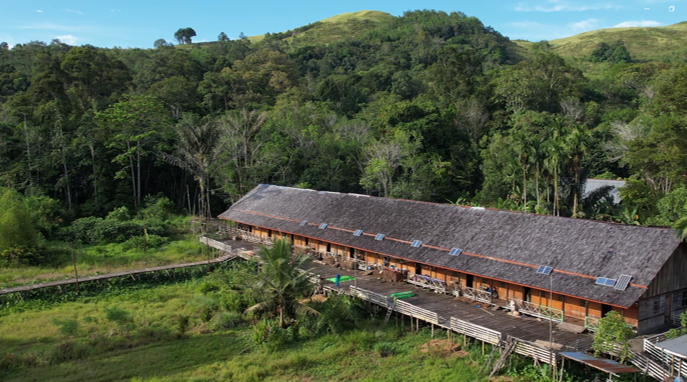
The Iban people are one of the oldest tribes on the island of Borneo. The beginning of their civilization dates back to Kampung Tampun Juah-West Kalimantan, where it is believed that they coexisted with supernatural beings known as panggau or khayangan. In that community, the panggau taught traditions and culture, such as weaving, conducting rituals, practicing ancestral beliefs, and engaging in agriculture. The majority of the Iban tribe is scattered in the upstream areas of the Kapuas River and its tributaries, including the Embaloh River, Lake Sentarum, Nanga Badau, Putussibau, and extending into the region of Sarawak, Malaysia.
The Dayak Iban tribe is further divided into several sub-tribes such as Balau, Skrang, Saribas, Undup, Kumpang, Sebuyau, Seru, Empran, Katibas, and Gaat, each with its own distinct characteristics. The Dayak Iban people refer to their communities by the name of the village they inhabit or the name of the river near their settlement. The presence of rivers is crucial in determining their residence, where the orientation of their traditional houses must align with the upstream-downstream flow of the river.
The traditional house of the Iban people is called 'rumah betang' or 'rumah panjae.' Its structural framework is constructed from the finest woods, forming an elongated shape. Inside the house, there are partitions separating one room from another, but small doors serve as connections between rooms, similar to connecting doors. Practically, these small doors are very useful if neighbors suddenly need assistance or want to share food without being seen by others.
A rumah betang can accommodate hundreds of people and serves as a gathering place to share time and moments with each other. This fosters emotional closeness as they build connections daily. Living in a rumah betang comes with customary norms that bind and must be adhered to by the residents of the house.
In every rumah betang, there is a crucial position called 'Tuai Rumah.' This person plays a central role in customary affairs, determining the timing of rituals, acting as a mediator in conflict resolution, and making decisions based on mutual agreement. Typically, the tuai rumah is appointed due to their extensive knowledge of Iban customs. Both men and women have equal opportunities to become a tuai rumah. The tuai rumah's room is always situated in the middle of the rumah betang, with sapits on the left and right sides. Sapits, also known as 'wali tuai rumah,' take on the role of the tuai rumah when they are not present in the rumah betang. In each family, the female head of the household is considered equal to the male head. Women also play an equal role in customary events.
In the life cycle of the Iban people, from infancy, marriage, to death, there are always accompanying rituals as a way of maintaining intimate relations with ancestors, God, and fellow humans. When Iban youths reach adulthood, they undertake the tradition of 'bejalai,' where young individuals leave their customary community to learn, broaden their horizons, or work to gain experience. Upon returning to the village, they bring back the knowledge and experiences acquired, using them as preparation for their future lives and sharing them with others in their community. As a symbol of having undergone bejalai, they tattoo their bodies with traditional motifs, strengthening the Iban character within the young individuals.
In the Encyclopedia of Iban Studies, the Iban people have more than 75 types of celebratory rituals, with 25 of them related to scheduled rice farming activities throughout the year, while others are performed based on individual abilities. Some rituals are conducted due to dreams, as supernatural powers manifest in human dreams to convey indications or warnings to humanity, urging caution in their lives or expressing gratitude for significant achievements.
The level of prosperity is often determined by the abundance of rice harvests. To achieve a bountiful harvest, they involve every family member in working the fields. There is a wage system using money or rice when employing others. However, for those who don't have enough capital to pay for labor, they take turns helping each other through a mutual assistance system. In their daily lives, most of their time is spent in the fields, and the rumah betang only serves as a resting place from late evening until morning. Thus, the fields play a role as a place for exchanging local knowledge within the customary community.
Hardiyanti
